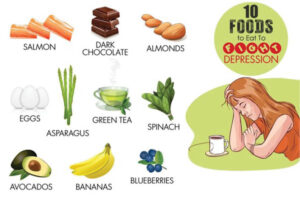 I was recently treating a new patient struggling with anxiety, depression, brain fog and fatigue. In her mid-40s, she couldn’t even get out of bed on some days because her life is hampered by various health problems – which mostly seem to be psychological! Over the past few years, she has seen numerous, has had multiple blood tests and scans done – all of which came out normal. After this, she was put on antidepressants and various anti-anxiety pills. Even after all this, somewhere she knew that her problem wasn’t being addressed at its root. Everything felt superficial and that’s when she decided to speak to me.
I was recently treating a new patient struggling with anxiety, depression, brain fog and fatigue. In her mid-40s, she couldn’t even get out of bed on some days because her life is hampered by various health problems – which mostly seem to be psychological! Over the past few years, she has seen numerous, has had multiple blood tests and scans done – all of which came out normal. After this, she was put on antidepressants and various anti-anxiety pills. Even after all this, somewhere she knew that her problem wasn’t being addressed at its root. Everything felt superficial and that’s when she decided to speak to me.
This is not an isolated incident. The patient is just one of many I’ve seen over the years, especially post-pandemic with similar experiences – unexplained symptoms with no answers. However, one often tends to overlook ‘inflammation’ as the rogue factor which impacts one’s mental condition.
So, How Are Anxiety And Depression Related To Inflammation? Depression was the first mental health condition to be related to inflammation, but due to its similarities with anxiety — and the fact that these often occur together — anxiety wasn’t far behind. Research has shown that anxiety symptoms are correlated with inflammation. Higher levels of inflammation have also been observed in patients with post-traumatic stress disorder (PTSD), panic disorders and generalized anxiety disorder.
I’ve experienced my close ones dealing with anxiety and depression in the past, so I’ll be the first one to agree that it’s a real challenge. Every piece of the anxiety puzzle is unique. The factors on this list are interconnected because your body is brilliantly interconnected as well. Let’s Explore Some Common Lifestyle Triggers Of Anxiety And Depression…
Caffeine: Everybody digests a cup of tea or coffee differently. If you have a gene which works normally, caffeine might not be a big trigger. In other cases, every sip of caffeine can feed your anxiety. To understand this better with regard to you, connect with your healthcare provider
Sugar: The sweet stuff fuels the fire of anxiety. Many studies have shown that the more sugar you consume (especially white, refined sugar), the worse your anxiety can get. And it all can be traced back to your microbiome. The correct balance of bacteria in your microbiome is responsible for your health. You can either feed good bacteria or bad bacteria through the foods you choose to eat. Sugar is the perfect fuel for all types of bad bacteria.
Irregular Menstrual Cycles: Many of my patients dealing with anxiety usually have an underlying hormonal imbalance during different times of their cycle, especially before menstruation, when there is an imbalance between the female hormones – all of which can fuel anxiety.
Thyroid problems: Each cell in your body has a thyroid site – meaning, if your thyroid isn’t working well, then nothing is. Underlying thyroid pathway problems like autoimmune thyroid (Grave’s or Hashimoto’s disease) or thyroid conversion issues can contribute to anxiety.
Alcohol intake: Alcohol is often misunderstood to curb anxiety. That’s not a good idea. Research proves that alcohol consumption is associated with worsening of anxiety disorders, over time. Studies have also shown that alcohol abuse can rewire the brain and contribute to feelings of anxiety.
Food Intolerances: It all comes down to the food that you eat or don’t eat. Clinically, I’ve seen that just removing a patient’s particular food sensitivity, like gluten or dairy or any other allergy, reduces or even eliminates their anxiety!
Diabetes: Blood glucose balance is essential for brain health. If your blood sugar goes up and down, it is anything but fun. Thankfully, you can do a lot to naturally balance your blood sugar.
Nutritional Deficiencies: Your body needs each vitamin and mineral for a specific purpose. Magnesium and Vitamin D deficiencies can contribute to anxiety
The following Lifestyle changes will help you naturally manage Anxiety and Depression:
Heal Your Second Brain – ‘The Gut’: Fixing your gut will fix half of your problems. Working with a specialist not only helps in healing your gut but also in alleviating your mood.
- Go The Low-Carb Way: Research has shown that reducing carbohydrates in your everyday routine has a direct impact on reducing your anxiety.
- Intermittent Fasting: Going without food for a specific time period helps in reducing inflammation.
- Improve Nutritional Deficiencies: Correcting your vitamin D levels and adding magnesium and B12 supplement has been known to reduce anxiety levels.
- Talk It Out: CBT (Cognitive Behavioural Therapy) is one of the most effective therapies known to reduce depression episodes
A few foods that help reduce anxiety and depression include Chamomile tea, Rooibos tea, Kefir (dairy-based probiotic), Turmeric (active component – curcumin), Organ meats, Avocados, 70% & above dark chocolate, Asparagus, and Leafy green veggies.
Anxiety and depression can be extremely difficult to overcome all on your own. It’s really alright to ask for help! It is never about putting a band-aid over your symptoms, it’s about helping you truly heal and have more freedom over your body, mind and soul!
- Healing or Harmful? - 15 March2025
- The Parsi Woman’s Guide To Superfoods For Hormonal Health - 8 March2025
- Strengthen Your Constitution This Republic Day! - 25 January2025
